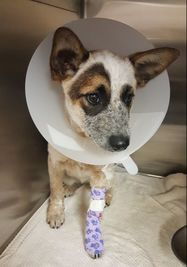 Here is a young pup that got into something. After a night in the hospital she felt much better.
Here is a young pup that got into something. After a night in the hospital she felt much better. These poisons are made to be tasty to animals. If you use these make sure to place them in locations that can not be reached by your pets. ie: locked rooms or cabinets. Also be on the look out for the dead rodents ingestion of them by your furry friend can also cause problems.
The different types affect them in different ways but can all be fatal if not caught and treated in a timely manor.
The 3 types of poisons.
Anticoagulants such as Warfarin, Bromadiolone, Pindone, Diphacinone, and Chlorohacinone to name a few, block the synthesis of Vitamin K, an essential component in normal blood clotting. This can cause spontaneous and uncontrolled bleeding. Sometimes the bleeding can be seen externally with nose bleed, bloody vomit or bleeding from the rectum. However unseen internal bleeding into the chest or abdomen can also occur.
Bromethalin can cause increased volume and pressure of the cerebrospinal fluid. This can lead to a number of neurological symptoms.
Zinc Phosphide also found in pesticides causes a release of gases when mixed with stomach acid. This can cause bloody vomit and respiratory signs as well as neurological signs.
Signs and Symptoms
Anticoagulants: Others:
Lethargy, depression Lethargy, depression
Pale or bleeding gums Loss of appetite
Blood in vomit, urine or stool Stumbling
Bloody nose Vomiting
Bruising Seizures or Paralysis
Treatment
If you think your pet has ingested the toxin in the last few hours you may be instructed to induce vomiting.
Even if your animal does vomit up the poison you need to be seen by a veterinarian as soon as possible.
Your pet may need other treatments such as iv fluids, Vitamin K, activated charcoal and other meds to control the symptoms. Other diagnostics may also need to be preformed to see the extent of the poisoning.
Do not induce vomiting unless instructed to do so by a veterinarian.
It may take several weeks on meds for your pet to fully recover. Repeat bloodwork may be preformed to insure treatment is working.
 RSS Feed
RSS Feed
